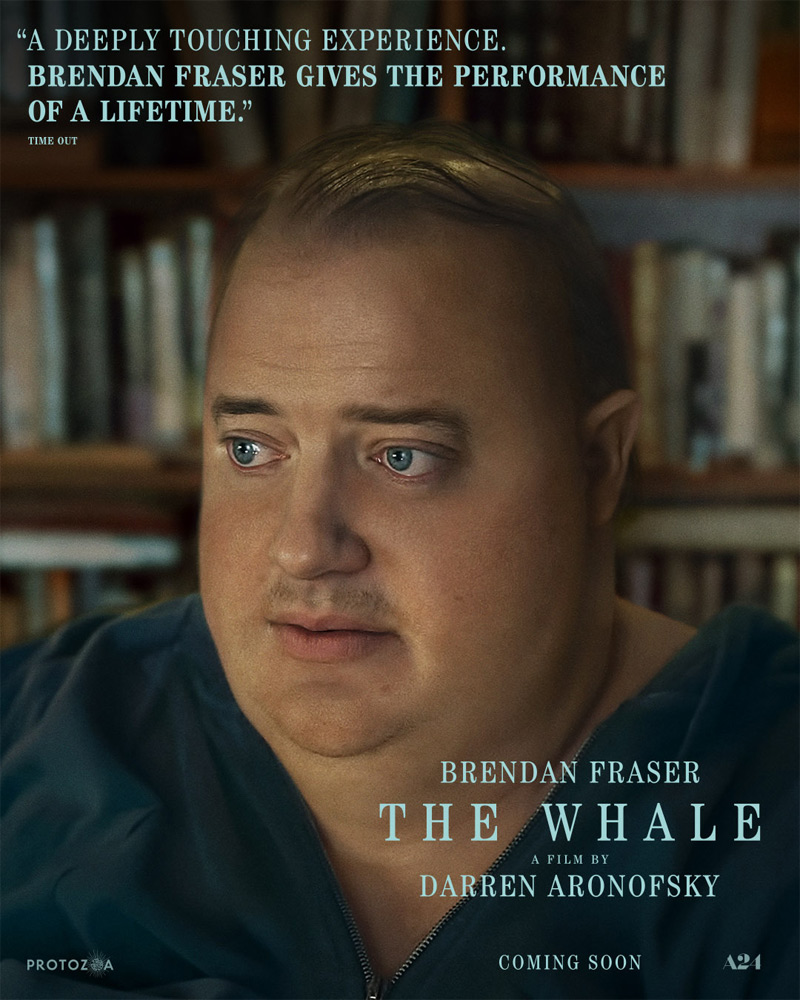
A lot has been said about Brendan Fraser’s performance as a 600 pound man trapped in his apartment somewhere in Idaho. I don’t think more needs to be added by me, but after seeing it a second time, I realized what it was that bothered me the first time around, and it wasn’t the fact that he’s wearing a fat suit. In fact I thought the depiction of what enormously fat people have to do to get by in life was extremely sensitive. He needs a kind of claw to pick things up that have fallen on the ground (or in one case, the aid of someone else). He has an enormous brush on a kind of extension pole in order to bathe and also a ring to hold onto to prevent himself from falling.
He needs another ring to help him get into bed, and he has a very large walker which enables him to move about the apartment. His closest friend is enormously sympathetic as she brings him food that he knows he will need, even as she wishes he would get some help.
No what bothered me is that the movie is dated and I couldn’t see this the first time. But it’s especially true of the evangelical missionary that shows up at the beginning of the play and tries, over the course of it, to get Charlie to find Jesus so that he can be reborn when the end of the world comes. I know the hatred for gays, partly because there’s so much new talk about transgendered people, is on the rise. But this kid is woefully out of touch with contemporary awareness. It’s like he time traveled and didn’t get the message that gay men (Charlie is gay and has a daughter he fathered when he was married to a woman) are not apologetic anymore and are not shamed into thinking they must change. The missionary reveals that he is actually on the run from the law, having stolen several thousand dollars from his church, and he is also lying about their church sending people out on missions. The church, called “New Life,” now hands out pamphlets on the street corners and this is the extent of their missionary work. The reason the missionary is pretending to be on a mission is because he wants to do something — he doesn’t want to just pass out pamphlets. That’s an honest thing: most young people want to do things in their lives and many want to do good things. But to come into a gay man’s home, and preach, as he does at the end, that the reason he is fat is because he’s gay and has embraced sin, and that the reason Charlie’s lover killed himself is because he sinned — it’s just something that wouldn’t happen anymore.
The play was produced in 2012 so it means it was probably written in 2010 at the latest. But a lot has changed in a decade, and although I really admired the fact that at the base of Charlie’s unhappiness and his weight gain is the loss of his lover (who was also his friend Liz’s brother), and who, in some very subtle dialogue, it sounds as though he might have had the exact opposite of Charlie’s problem: anorexia, it all felt a little off somehow. They were ideas and situations that were probably very new at the time: teaching a class online without a camera in order to hide his obesity from his students; a gay man trying to reach out (and save) his daughter; the angry and possibly vicious daughter; the insecure missionary. But today it doesn’t quite add up, and if people weren’t so obsessed with body imagery and especially Brendan Fraser’s performance, which is, indeed, heartbreaking — they might have seen how this has not aged particularly well. It’s a bit of a time piece. And one of my own frustrations about writing, especially about gay men, is that what you write today, is obsolete almost as soon as you finish it.
The Whale refers to Moby Dick and the White Whale and in particular, an essay his daughter wrote which Charlie finds unbelievably beautiful. This is okay, but what really tugs at your heart and caused me to cry many times, was the desperation a man who is dying of congestive heart failure and has only a week to live is trying to save his daughter from a future she is hurtling into like the blind angry snot that she is.
